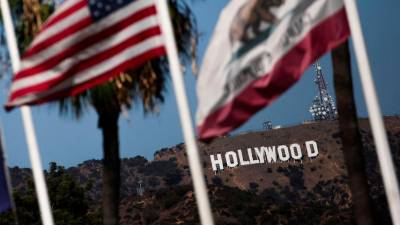WASHINGTON: President Donald Trump announced on Monday he would impose a 100% tariff on all films produced overseas that are then sent into the United States.
This move repeats a threat first made in May that would fundamentally disrupt Hollywood’s global business model.
The step signals Trump’s willingness to extend protectionist trade policies into cultural industries.
This creates significant uncertainty for studios that depend heavily on cross-border co-productions and international box-office revenue.
“Our movie making business has been stolen from the United States of America, by other Countries, just like stealing candy from a baby,“ Trump said in a post on his Truth Social platform.
It remains unclear what legal authority Trump would use to impose a 100% tariff on foreign-made films.
The White House did not immediately respond to a Reuters request for comment on how the tariffs would be implemented.
Major US studios including Warner Bros Discovery, Paramount Skydance and Netflix also did not immediately respond to requests for comment.
Comcast declined to comment on the proposed tariff announcement.
“There is too much uncertainty, and this latest move raises more questions than answers,“ said PP Foresight analyst Paolo Pescatore.
“For now, as things stand, costs are likely to increase, and this will inevitably be passed on to consumers,“ he warned.
The president first floated the idea of a movie tariff in May but offered few details at that time.
Entertainment executives were left unsure whether the tariff would apply to specific countries or all film imports.
After the May announcement, a coalition of American film unions and guilds sent a letter to Trump.
They urged him to support tax incentives for domestic film production in a reconciliation package being drafted in Congress.
This aimed to help return more movie and television projects to the United States.
The US film industry recorded a $15.3 billion trade surplus in 2023.
This surplus was backed by $22.6 billion in exports to international markets according to the Motion Picture Association.
Studio executives told Reuters earlier this year they were flummoxed by how a movie tariff might be enforced.
Modern films often use production, financing, post-production and visual effects spread across multiple countries.
Hollywood has increasingly relied on overseas production hubs such as Canada, the UK and Australia.
Tax incentives in these countries have attracted big-budget shoots for films ranging from superhero blockbusters to streaming dramas.
Co-productions with foreign studios have become more common particularly in Asia and Europe.
Local partners in these regions provide financing, access to markets, and distribution networks.
Industry executives also warn that a broad tariff could affect thousands of US workers employed on overseas shoots.
These workers include visual effects artists and production crews whose work is often coordinated across multiple countries. – Reuters
